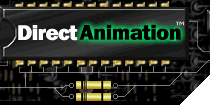



Contents
Index
Topic Contents
Previous Topic: DXMCanvas Class
Next Topic: DXMException Class
 |
 | 
|

|
| |||
| |||
DXMEvent Class
public class DXMEvent extends Behavior{ // Constructor public DXMEvent(); // Methods public DXMEvent attachData(Object object); public DXMEvent notifyEvent(UntilNotifier notifier); public Object registerCallback(EventCallbackObject object, BvrsToRun extraBvrsToRun, boolean bool); public DXMEvent snapshotEvent(Behavior a); public static DXMEvent newUninitBvr(); }Creates an object that represents an event. Events identify specific times, states or user actions and are used to specify when given actions should occur. Typically, you use events with the until and untilNotify methods to create behaviors that change as a result of the event. For example, you can change the color of an object when the user presses a mouse button by specifying the mouse button event in a call to the until method of the ColorBvr class. Every event, when it occurs, returns some event data. This data may or may not be meaningful. The data returned, for example, by leftButtonDown has no meaning.
You can combine existing events to create new, more complex events. For example, the andEvent method lets you combine two events so that the resulting event occurs only if both of the original events occur simultaneously.
- DXMEvent Constructor
- DXMEvent Methods
- Relevant Methods from the Statics Class
- Relevant Fields from the Statics Class
DXMEvent Class
DXMEvent ConstructorConstructs a DXMEvent object.
public DXMEvent( );
DXMEvent Methods
DXMEvent Class
attachDataTakes an arbitrary object and produces a new event. The new event occurs at the same time as the original event, but its data is now the data that was specified in the call to attachData.
public DXMEvent attachData(
Object object
);Parameters
- object
- An arbitrary object.
Return Values
Returns a DXMEvent object. The event data is the event data of the new event.
Remarks
This method allows an application to associate arbitrary client data with an event and know that it will be delivered to the notifier when the event occurs. In the following example, the behavior is red until the left mouse button is pressed. It then passes either green or yellow, depending on what is returned by the notifier.
DXMEvent greenLeft = leftButtonDown.attachData(green); DXMEvent yellowright = rightButtonDown.attachData(yellow); ColorBvr myBvr = (ColorBvr)untilNotify(red, orEvent(greenLeft, yellowRight), notifier);DXMEvent Class
notifyEventCreates a new event. This occurs when the original event occurs. It then calls the notifier and uses the result as its event data.
public DXMEvent notifyEvent(
UntilNotifier notifier
);Parameters
- notifier
- Returns the new behavior.
Return Values
Returns the DXMEvent object. The event data is the time the event fired and the new behavior.
DXMEvent Class
registerCallbackCauses an external action when an event occurs in DirectAnimation for Java and is used in conjunction with the EventCallbackObject. Whenever that event occurs, the invoke method of the callback is called with the event data produced by the event.
public Object registerCallback(
EventCallbackObject object,
BvrsToRun extraBvrsToRun,
boolean bool
);Parameters
- object
- An object that implements the EventCallback interface.
- extraBvrsToRun
- Behaviors that are not part of the model.
- bool
- If true, the first occurrence of the event will trigger invoke. If false, every occurrence of the event will trigger invoke.
Return Values
Returns an object of type java.lang.Object. This object can be used to unregister the callback.
Remarks
An example of where this method is used is displaying a GUI window when the mouse moves to a particular area.
See Also
DXMEvent Class
snapshotEventWhen called on an instance of a behavior, samples the given behavior and returns it as a constant behavior with the value as data. The event time of the new event is when the original event occurs.
public DXMEvent snapshotEvent(
Behavior a
);Parameters
- a
- The Behavior object which will be sampled when the method is invoked.
Return Values
Returns the DXMEvent object. The event data is the value of the behavior at the time it was sampled, returned as a constant behavior.
Remarks
In the following example, the value of n is localTime until the left mouse button is pressed. It then becomes whatever the value of localTime was when the event occurred:
n=until(localTime, leftButtonDown.snapshotEvent(localTime));DXMEvent Class
newUninitBvrThis method allows you to refer to an DXMEvent behavior before that behavior has been defined. With this method you can create the behavior and use it in the definition of other behaviors, but not actually define its contents until some later point. (This is accomplished with the init method, which is available on all behaviors.) The system generates a run-time error if you initialize a non-uninitialized behavior, initialize an uninitialized behavior that has already been initialized, or run an initialized behavior that has not yet been initialized.
public static newUninitBvr( );
Return Values
Returns the DXMEvent object.
Relevant Methods from the Statics Class
The following methods are defined in the Statics class and are most relevant to objects of type DXMEvent.
public static DXMEvent andEvent(DXMEvent first, DXMEvent second);
public static DXMEvent keyDown(int keyCode)
public static DXMEvent keyUp(int keyCode)
public static DXMEvent notEvent(DXMEvent ev);
public static DXMEvent orEvent(DXMEvent first, DXMEvent second);
public static DXMEvent predicate(BooleanBvr bool);
public static DXMEvent thenEvent(DXMEvent e1, DXMEvent e2);
public static DXMEvent timer(NumberBvr timeout);
public static void unregisterCallback(Object object);
Relevant Fields from the Statics Class
The following fields are defined in the Statics class and are most relevant to objects of type DXMEvent.
public final static DXMEvent always;
public final static DXMEvent leftButtonDown;
public final static DXMEvent leftButtonUp;
public final static DXMEvent never;
public final static DXMEvent rightButtonDown;
public final static DXMEvent rightButtonUp;
© 1998 Microsoft Corporation. All rights reserved. Terms of Use.